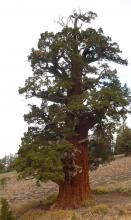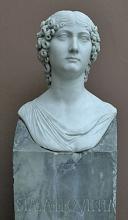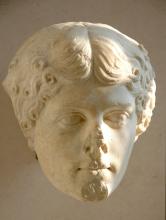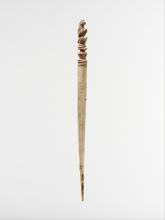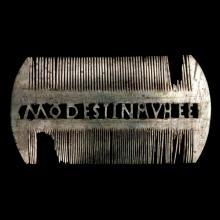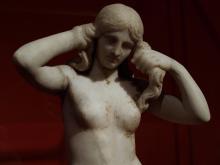Dīcēbam “medicāre tuōs dēsiste capillōs”;
tingere quam possīs, iam tibi nūlla coma est.
at sī passa forēs, quid erat spatiōsius illīs?
contigerant īmum, quā patet, usque latus.
quid, quod erant tenuēs et quōs ornāre timērēs,5
vēla colōrātī quālia Sēres habent,
vel pede quod gracilī dēdūcit arānea fīlum,
cum leve dēsertā sub trabe nectit opus?
nec tamen āter erat neque erat tamen aureus ille
sed, quamvīs neuter, mixtus uterque color,10
quālem clīvōsae madidīs in vallibus Īdae
ardua dēreptō cortice cedrus habet.
adde quod et docilēs et centum flexibus aptī
et tibi nūllīus causa dolōris erant.
nōn acus abrūpit, nōn vallum pectinis illōs;15
ōrnātrix tūtō corpore semper erat;
ante meōs saepe est oculōs ōrnāta nec umquam
bracchia dēreptā saucia fēcit acū.
saepe etiam nōndum dīgestīs māne capillīs
purpureō iacuit sēmisupīna torō;20
tum quoque erat neglēcta decēns, ut Thrācia Bacchē,
cum temerē in viridī grāmine lassa iacet.
cum gracilēs essent tamen et lānūginis instar,
heu, mala vexātae quanta tulēre comae!
quam sē praebuerunt ferrō patienter et ignī,25
ut fieret tortō nexilis orbe sinus!
clāmābam "scelus est istōs, scelus, ūrere crīnēs.
sponte decent: capitī, ferrea, parce tuō.
vim procul hinc removē: nōn est, quī dēbeat ūrī;
ērudit admōtās ipse capillus acūs."30
fōrmōsae periēre comae, quās vellet Apollō,
quās vellet capitī Bacchus inesse suō;
illīs contulerim, quās quondam nūda Diōnē
pingitur ūmentī sustinuisse manū.
quid male dispositōs quereris periisse capillōs?35
quid speculum maestā pōnis inepta manū?
nōn bene cōnsuētīs ā tē spectāris ocellīs:
ut placeās, dēbēs immemor esse tuī.
nōn tē cantātae laesērunt paelicis herbae,
nōn anus Haemoniā perfida lāvit aquā,40
nec tibi vīs morbī nocuit (procul ōmen abestō),
nec minuit dēnsās invida lingua comās:
facta manū culpāque tuā dispendia sentīs;
ipsa dabās capitī mixta venēna tuō.
nunc tibi captīvōs mittet Germānia crīnēs;45
tūta triumphātae mūnere gentis eris.
ō quam saepe comās aliquō mīrante rubēbis
et dīcēs “ēmptā nunc ego merce probor.
nescioquam prō mē laudat nunc iste Sygambram;
fāma tamen meminī cum fuit ista mea.”50
mē miserum! lacrimās male continet ōraque dextrā
prōtegit ingenuās picta rubōre genās;
sustinet antīquōs gremiō spectatque capillōs,
ei mihi, nōn illō mūnera digna locō.
collige cum vultū mentem: reparābile damnum est;55
postmodo nātīvā cōnspiciēre comā.
notes
1.14: Bad Hair
If we take the first couplet literally, we have to believe that all the girl’s hair (we may assume she is Corinna) has fallen out. If so, we also conclude that our poet is astonishingly heartless: a major cosmetic disaster of this sort is no time to be saying “I told you not to do it.” [full essay]
1–2: dīcēbam: notice the tense: the poet kept saying it, but she didn’t listen. Now he has his opportunity to say "I told you so!" medicāre tuōs dēsiste capillōs: Roman love elegists seem to prefer the "natural look" in their mistresses, complaining of their reliance on makeup, perfumes, dyes, overly elaborate hair ornamentations, and the like. Ovid joins the chorus here in demanding that his puella stop dying her hair. possīs: potential subjunctive (AG §445-447). tibi: dative of possession.
3–4: passa forēs > patior, patī, passus, "leave alone, let be"; passa forēs is a poetic equivalent of passa essēs (AG §170a). erat: a mixed condition (AG §517b): in the apodosis of a contrary to fact condition, the use of an imperfect indicative instead of the imperfect subjunctive expresses that the action was intended to happen, likely to happen, or already begun. Cf. eram (6.34). illīs: capillīs. contigerant ... latus: "they would have reached right to the bottom, to the fullest extent, of your side" (Barsby). The subject is capillī. imus -a -um = "the lowest part of." latus is singular for plural. patet = "extends in space" (OLD 7a). quā = "where."
5–6: quid, quod: "what of the fact that"; an idiomatic expression, short for quid dē hōc dīcendum est quod. erant tenuēs: understand capillī as the subject. quōs ... timērēs: relative clause of characteristic, "the sort (of hair) you would be afraid to ...." vēla colōrātī quālia Sēres habent: "like the fabrics that the colored Chinese wear," i.e., like silk; the Chinese are colōrātī because they produce brightly colored silks (transferred epithet).
7–8: vel ... quod ... fīlum: "or the filament which"; the odd word order allows for the placing of filum in last position for emphasis.
9–10: ille: clarified by color in line 10. mixtus: supply erat.
11–12: quālem: supply colōrem, "the sort of color which." Īdae > Īda, -ae. f. "Mt. Ida." There are two mountains named Ida, the one in Crete on which Jupiter was born, and the one near Troy on which the Judgment of Paris took place; Ovid is probably referring to the Trojan one. dēreptō cortice: "when its bark has been stripped." Cedars do not grow on Mt. Ida near Troy, so the tree in question here is probably in fact the juniper, which when stripped of its bark reveals an auburn wood. Dark-haired Roman women seemed to favor a reddish tint, achieved in early times through a concoction of ashes and later through dyes from Gaul and Germany (Barsby). A towering 800+ year-old example of the Mediterranean juniper growing in the Taurus Mountains near Çamlıyayla, Turkey perhaps gives an impression of the color that Ovid had in mind.
13–14: adde quod: "not to mention the fact that ...." docilēs: "teachable," "responsive (to styling)," with capillī (understood). flexibus: "curls, waves" (literally the "act of bending or curling"). nūllīus ... dolōris: objective genitive; your hair never caused you any distress.The elaborate curls and braids of Roman hairstyles of Ovid's day are perhaps best seen in a somewhat later portrait, that of the freedwoman Staia Quinta. This female head and the associated herm were excavated (together but not attached) at the Temple of Diana at Lake Nemi in 1887, and are usually dated to the first century AD. The herm is inscribed STAIA • L • L • QUINTA (the L.L. standing for Lucii liberta, freedwoman of Lucius). At the top of the head the hair is parted, and it continues in waves to the temples, where the hair is curled. Curls cover most of the lower part of the head when seen from the back, but Staia had obviously longer hair than this, and the excess is caught in two braids at the back of the neck, perfectly symmetrical and hanging down to the edge of her clothing. A style akin to this, though simpler, is also seen in portraits from closer to Ovid's lifetime: those of the elder Agrippina (14 BC-AD 33), wife of Germanicus and grandmother of Nero. Here again the hair begins at the central part in waves and goes on to elaborate curls, and this is perhaps what Ovid has in mind in centum flexibus apti.
15–16: acus > acus, -ūs, f., "hairpin." vallum pectinis: "the palisade of the comb," a humorously grand phrase for a humble object. The vallum was a fortification made of sharpened stakes and placed on top of an earthwork; acus and vallum are both subjects of the verb, abrūpit. ornātrix > ornātrix, -icis f. "hairdresser, lady’s maid" (rare); literally a female slave who assisted her mistress in getting dressed and adorned. tūtō corpore: ablative of description, used predicatively. The ornātrix was safe because the hair of her mistress did not get badly tangled, and thus did not provoke an angry response. Many Roman hairpins (acus) have been found, often of ivory, sometimes of bronze or gold. An ivory example in the Metropolitan Museum is decorated with the figure of a seated monkey. Combs (pectines) too were often ivory, and double-sided, as in an interesting example from a grave, now in the British Museum. It is carved with the name of the deceased, "Modestina, farewell"—though the last word (vale) seems to be misspelled.
17–18: est ... ornāta: "she had her hair done." bracchia: understand ornātricis. dēreptā ... acū: "with a snatched hairpin," i.e., snatched out of the hand of the ornatrix.
19–20: nōndum digestīs ... capillīs: ablative absolute. The narrative recalls with admiration the times when his mistress lay half-reclined in bed early in the morning before her hair had been done up. He found this to be quite becoming (decēns, 21).
21–22: Bacchē: "a Bacchante"; a Greek nominative singular. temerē: "at random, casually."
23–24: cum ... tamen essent: "nevertheless, though they were"; a concessive cum clause. lānūginis instar: "like down." instar is a neuter noun, found only in the nominative and the accusative singular, meaning "the equivalent" or "just like"; it often takes a genitive. heu, mala vexātae quanta tulēre comae! mock-tragic in tone. "Alas! How many evils your troubled hair has endured!"
25–26: quam: with patienter, "how patiently." sē praebuerunt: "they submitted (themselves) to." ferrō ... et ignī: the reference here is to the use of hot curling irons, although more frequently these nouns are used in a military context to describe a city’s destruction by fire and sword. ut ... sinus: "so that tight ringlets in coiled spirals might be created." sinus can mean merely something that is curved. nexilis -e = "plaited, intertwined." tortō means "twisted" ( > torqueō), but with the nuance "tortured." Many busts of Roman women depict the type of hairstyle alluded to here, especially those with rows of little curls piled up high and encircling the face.
27–28: ūrere: subjective infinitive. sponte decent: "they are appealing in their natural form," literally "of their own free will." capitī ... tuō: dative object of the verb parce. ferrea: vocative case, addressed to Corinna, who is hard-hearted like iron because she does not have compassion for her hair.
29–30: vim: vīs here means "violence." nōn est, quī = nōn est capillus quī, "It is not the kind of hair that should be burned"; relative clause of characteristic. ērudit ... acūs: "the hair itself instructs the hairpins that have been applied to it." The conceit is that her hair’s natural inclinations (sponte, 28) are better than any hairdresser.
31–32: Apollō/ ... Bacchus: both Apollo and Bacchus (Dionysus) were famous for their beautiful long hair. periēre: = periērunt, alternate form of perfect tense 3rd person plural. vellet/ ... vellet: potential subjunctive; "hair that Apollo, (and) that Bacchus would want." capitī ... suō: dative with the compound verb inesse.
33–34: illīs contulerim, quās: "I would compare them to those (hairs) which." contulerim is potential subjunctive (perfect tense), see AG §447.1, used in first person singular expressions of cautiously saying, thinking or wishing. Diōnē > Diōnē, -ēs, f. Dione was the mother of Aphrodite, but the name is often used for Aphrodite/Venus herself. pingitur: the 4th-century Greek painter Apelles painted a famous picture of "Aphrodite Anadyomene" ("Aphrodite Rising from the Sea"), which showed her wringing sea water out of her hair; the painting was brought to Rome by Augustus (Pliny, Natural History 35.91). Aphrodite Anadyomene was often depicted in sculpture as well. A small but attractive version in the Berlin Pergamon Museum shows her lifting her hair as Ovid describes.
35–36: male dispositōs: "(which you considered to be) badly ordered"; it is the girl who had this opinion of her lost hair; Ovid seems to have liked the messiness. maestā: transferred epithet; though the adjective agrees with manū, it more logically describes the mistress who has just looked at herself in the mirror. pōnis: "lay aside, put down." inepta: "foolish"; here the adjective is best translated as an adverb.
37–38: nōn bene ... ā tē spectāris: "it’s wrong for you to be looked at by yourself," i.e. to look at your own reflection. The grammatical awkwardness makes sense once we realize that the poet is addressing the image in a mirror. consuētīs ... ocellīs: "with eyes that are accustomed (to looking at you as you once were)." ut placeās: supply tibi. tuī: objective genitive (AG §348); "of your (former) self."
39–40: cantātae: "bewitched"; modifies herbae. paelicis > paelex, -icis, f., a mistress who was a rival to a wife or lover. lavit: "has washed up." Haemonia > Haemonius, -a, -um "Haemonian, Thessalian"; Thessaly was traditionally associated with witchcraft.
41–42: tibi: dative with the verb nocuit. procul omen abestō: "may ill-omen be far away," "may ill-omen not attend my words." abestō is future imperative, third person singular; the form is typical of formal prayers. invida lingua: "jealous tongue," i.e., a curse or evil spell.
43–44: facta: supply esse for a perfect passive infinitive in indirect discourse, "you perceive that your loss was produced." venēna > venēnum, -ī, n. "magic potion" or "poison." When modified by certain proper adjectives the word can also mean "dye."
45–46: captīvōs mittet crīnēs Germānia: wigs made from hair imported from Germany were particularly desirable; the military imagery is appropriate in view of the Germans’ custom of cutting their hair as a sign of surrender. mūnere: "thanks to the gift"; ablative of means or cause.
47–48: emptā ... merce > merx, -cis, f. "a commodity"; ablative of cause (AG §404); Corinna will not receive approval for her natural beauty, but because of something she has bought.
49–50: iste: the male admirer of line 47. nescioquam: modifies Sygambram, "some Sygambrian woman, I know not who"; note the bracketing of the line with the adjective and its modified noun. Sygambram > Sygamber, -bra, -brum "of the Sygambri" (a tribe of Germans recently subjugated by Augustus); here a woman of that tribe. fāma ... cum fuit ista mea: "when that glory was my own."
51–52: mē miserum: accusative of exclamation (AG §397d), "oh, this is awful!" "oh dear!" lacrimās male continet: "she scarcely contains her tears." This and the gestures that follow are signs of Corinna’s regret and shame, as if she has taken Ovid’s words to heart. ōraque > ōs, ōris, n. here "face" as often; plural for singular. dextrā: supply manū; ablative of means. ingenuās: "tender, delicate" (cf. Amores 1.7.50). rubōre > rubor, -ōris, m. here perhaps both "redness of face" and "a feeling of shame."
53–54: sustinet: "holds up." gremiō > gremium, -(i)ī, n. "lap"; ablative of place where. nōn illō mūnera digna locō: "a gift that does not deserve that place"; in apposition to antīquōs ... capillōs in the preceding line. ei mihi: "woe is me!"; ei (a monosyllable) is an interjection, followed by a dative of reference (AG §379a). collige cum vultū mentem: "compose your mind along with your face"; zeugma in which the verb collige applies to both nouns but has rather different meanings in respect to each.
55–56: postmodo "later, presently"; adverb. nātīvā ... comā: i.e., your natural-born hair; it was taken for granted by the erotic poets that a girl’s natural beauty was preferable to artifice; there may also be an implied contrast between "home-grown" hair and that imported from Germany (see on line 45 above). conspiciēre = conspiciēris (future tense, 2nd singular passive); conspiciō here means "to notice, attract attention"; "you will soon catch the eye" (Barsby).
vocabulary
medicō -āre: treat, medicate (with); dye (with)
dēsistō -sistere -stitī: stand away, withdraw; desist
capillus -ī m.: hair
tingō tingere tinxī tinctum: wet, moisten; dye, color
spatiōsus -a -um: wide, spacious, large
tenuis -e: slender, thin
ornō -āre: decorate, beautify; arrange (hair); equip5
vēlum -ī n.: sail; fabric
colōrātus -a -um: colored
Sēres -um m.: Chinese
gracilis -e: slender, thin
arānea -ae f.: spider's web; spider
fīlum -ī n.: thread, string
trabs -is f.: beam, tree
nectō nectere nexī nexum: tie, bind, connect, weave
āter -tra -trum: dark, black
neuter -tra -trum: neither10
clīvōsus -a -um: steep, hilly
madidus -a -um: moist, wet; drunk
vallēs -is f.: vale, valley
Īda -ae f.: Mount Ida
arduus -a -um: towering, lofty
dēripiō -ripere -ripuī -reptum: snatch away, tear down
cortex -icis m.: bark, shell
cedrus -ī f.: cedar
docilis -e: teachable, responsive (to styling)
flexus -ūs m.: curl, wave; the act of bending or curling
acus -ūs m.: hairpin
abrumpō -rumpere -rūpī -ruptum: break off, sever
vallum -ī n.: palisade
pecten -inis m.: comb15
ornātrix -icis f.: hairdresser, lady's maid
brācchium -ī n.: the forearm (elbow to hand), arm
saucius -a -um: wounded
dīgerō -gerere -gessī -gestum: separate, spread
māne: (early in the) morning
purpureus -a -um: purple
sēmisupīnus -a -um: half-supine, half-reclining on one’s back
torus -ī m.: bed, couch20
neglegō -legere -lexī -lectum: neglect, disregard
decens decentis: becoming, seemly, attractive
Thrācius -a -um: Thracian
Bacchē -ēs f.: a Bacchante
temere: adv., at random, casually
viridis -e: green
grāmen -inis n.: grass, plant
lassus -a -um: tired, weary
lānūgō -inis f.: soft hair, down
instar n.: the equivalent, just like (+gen.)
heu: alas!
vexō -āre: attack constantly, harass, vex
patienter: (adv.) patiently25
torqueō torquēre torsī tortum: cause to roate, spin
nexilis -e: plaited, intertwined
clāmō -āre: shout, call
ūrō ūrere ussī ustum: burn
crīnis -is m.: lock of hair; (pl. or collective sg.) hair
sponte: (abl. sg. as adv.) naturally, by nature; voluntarily
ferreus -a -um: made of iron; hard-hearted
removeō -movēre -mōvī -mōtum: move back, withdraw, remove
ērudiō -rudīre -rudiī -rudītum: to instruct, train; free from roughness
admoveō -movēre -mōvī -mōtum: move to, apply to; (mil.) move up (into position)30
formōsus -a -um: shapely, beautiful
Apollō -inis m: Apollo
Bacchus -ī m.: Bacchus
insum -esse -fui: be in or on, be present
Diōnē -ēs f.: Dione, the mother of Aphrodite; often used for Aphrodite/Venus herself
pingō pingere pinxī pictum: paint, dye
ūmeō -ēre: be wet, moist
dispōnō -pōnere -posuī -positum: arrange, put in place; (mil.) to post, station35
speculum -ī n.: mirror
ineptus -a -um: foolish
consuētus -a -um: accustomed, usual
ocellus -ī m.: eye (diminutive)
immemor -oris: unmindful, forgetful
cantō -āre: bewitch
paelex -icis f.: a mistress who was a rival to a wife or lover
herba -ae f.: herb
anus -ūs f.: old woman, hag; sorceress
Haemonius -a -um: Haemonian, Thessalian
perfidus -a -um: faithless, treacherous, false
lavō lavāre lāvī lautum: wash, bathe40
ōmen -inis n.: omen, augury
minuō minuere minuī minūtum: make smaller, lessen, diminish
dēnsus -a -um: thick, dense; frequent
invidus -a -um: envious, jealous
dispendium -ī n.: expenditure, expense, loss
venēnum -ī n.: magic potion, poison; dye
captīvus -a -um: captured, captive45
Germānia -ae f.: Germany
triumphō -āre: have a triumph over, conquer
ō: oh!
rubeō -ēre: redden, blush
emō emere ēmī emptum: buy, purchase
merx -cis f.: commodity
Sygamber -bra -brum: of the Sygambri
prōtegō -tegere -texī -tectum: cover, conceal; protect52
ingenuus -a -um: tender, delicate
rubor -ōris m.: redness of face, a feeling of shame
gena -ae f.: cheek
gremium -ī n.: lap
ei: interj., ah! woe!
reparābilis -e: reparable, recoverable55
postmodo: adv, later, presently
nātīvus -a -um: native, natural
conspiciō -spicere -spexī -spectum: notice, attract attention, catch the eye of

